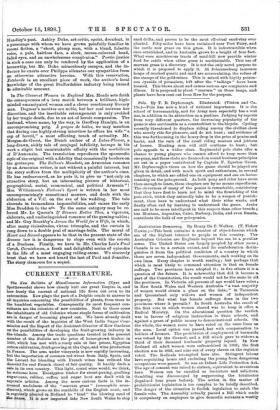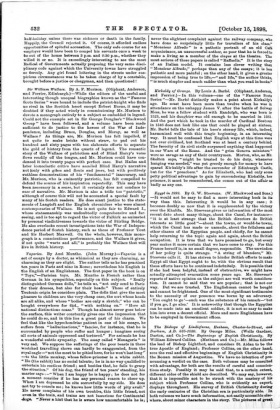Australasian Democracy. By Henry De P. Walker. (T. Fisher rnwin.)—This
book contains a number of object-lessons which are of the highest interest to people in this country. The Australian Colonies are Englands beyond the sea in a peculiar sense. The United States are largely peopled by other races ; Canada is so to a certain extent, and its confederation distin- guishes it from the political condition of a country in which there are seven independent Governments, each working on its own lines. Every chapter is worth reading ; but perhaps that which is most likely to command attention is that on femaler suffrage. Two provinces have adopted it ; in five others it is a. question of the future. It is noteworthy that did it become a. part of the Constitution, the result would not be the same in all the provinces. In Victoria all persons of age would have votes ; in New South Wales and Western Australia "a vast majority of women would. obtain a place on the lists ; " in Tasmania. and Queensland only widows and women of independent property. But what has female suffrage done in the two. provinces where it prevails ? In South Australia the result of the first vote in which women shared was to keep in office a. Radical Ministry. On the educational question the verdict was in favour of religious instruction in State schools, and. against a grant of public money to denominational schools. On the whole, the women seem to have voted on the same lines as the men. Local option was passed, but with compensation to. holdersof licenses. The prohibition of employment of barmaida was vetoed by the Council, and a Bill which gave to widows a. third of their deceased husbands' property lapsed. In New Zealand all adult women were enfranchised in 1892; the first election was in 1893, and nine out of every eleven on the register voted. The Radicals triumphed here also. Stringent labour laws regulating hours and excluding the young from dangerous occupations were passed. So was an Infant Life Protection Act. The age of consent was raised. to sixteen, equivalent to seventeen here. Women can be enrolled as barristers and solidtors. Gambling was discouraged by suppressing the totalisator (legalised. four years before). The action in the matter of prohibitionist legislation is too complex to be briefly described. The danger of the situation is foolish legislation to catch the female vote. The Assembly actually passed a Bill which made it compulsory on employers to give domestic servants a weekly half-holiday. unless there was sickness or death in the family. Happily, the Council rejected it. Of course, it afforded endless opportunities of spiteful accusation. The only safe course for an employer would have been to compel his servants once a week to be out of the house between 3 p.m. and 0.30 p.m., whether they willed it or no. It is exceedingly interesting to see the most Radical of Governments actually proposing the very same disci- plinary code against which the University towns have struggled so fiercely. Any girl found loitering in the streets under sus- picious circumstances was to be taken charge of by a constable, brought before a justice or clergyman, and then questioned







































 Previous page
Previous page